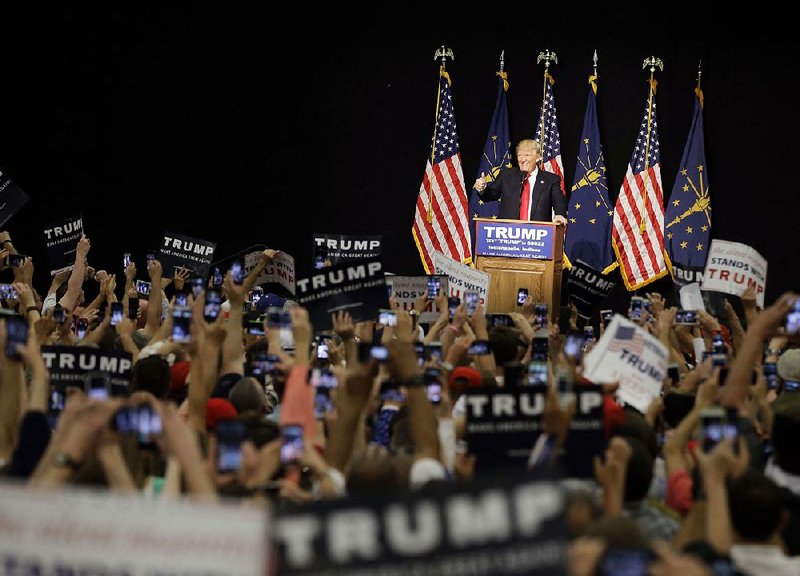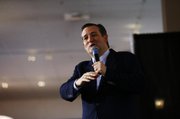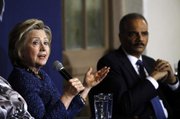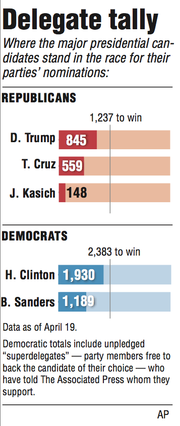WASHINGTON -- Front-runners Hillary Clinton and Donald Trump accelerated Wednesday toward Northeast primaries on their paths to presidential nominations after trouncing party challengers in New York.
FULL ELECTION COVERAGE
Clinton's victory in the Democratic primary in New York, a state she represented in the Senate for eight years, halted Sen. Bernie Sanders' recent string of victories and put her in a stronger position heading into the next contests.
While Trump strengthened his hand by winning 60.4 percent of the vote in New York's Republican primary, he is still far from avoiding a contested convention. The businessman's triumph in his home state keeps him on a path to securing the 1,237 delegates he needs, though he'll have to perform well in the round of primaries in Pennsylvania, Maryland, Connecticut, Rhode Island and Delaware on Tuesday and in California's contest on June 7.
His chief rival, Sen. Ted Cruz of Texas, snagged a scant 14.5 percent in New York and now has no mathematical path to getting the nomination through primary voting. But he sees a window to snatch the nomination from Trump at the convention, and his campaign is working to line up delegates who would support him if Trump fails to win on a first ballot.
Ohio Gov. John Kasich, who picked up 25.1 percent of the vote Tuesday and earned four delegates in New York, also is banking his campaign on a contested convention and has been campaigning as the only moderate Republican left on the ballot.
The side-by-side GOP efforts at this late stage -- with Trump amassing primary victories while Cruz and Kasich dig for the support of delegates who could settle the nomination -- are unprecedented in recent presidential campaigns and add to the uncertain nature of the race.
Trump basked in his victory at a rally in Indianapolis, where he drew several thousand people to a packed building at the state fairgrounds. Indiana votes May 3.
He railed against the Republican nominating system, pointing to Louisiana, where he was outmaneuvered by Cruz in the fight for delegates, and Pennsylvania, where the statewide winner gets 17 delegates outright and the remaining 54 "are up for grabs." Essentially, in each of the state's 18 congressional districts, Republican voters will not just select a presidential candidate, they also will choose a slate of three delegates that will go to the Cleveland convention unbound.
"They can take the delegates; they can put them in airplanes and fly them to resorts; they can have dinners with them; they can put them in hotels. Essentially what they're saying is they can buy the election," Trump said.
Cruz's campaign plans to persuade voters to elect its preferred delegates in each district.
"We're going to voters saying: When you go into the polls on election day, vote four times for Ted Cruz. Vote for Ted Cruz and vote for each of his three congressional district delegates," said Lowman Henry, Cruz's Pennsylvania campaign chairman.
Cruz campaigned in Hershey, Pa., trying to brush off his New York performance in which he failed to pick up a single delegate. He played down Trump's win, saying the mogul hoped to convince people that "Pennsylvania is a suburb of Manhattan."
"Donald, with a characteristic display of humility, declared this race is over," Cruz said. "Manhattan has spoken. And if the rest of the voters would quietly go home now and allow him to give the general election to Hillary, all would be better."
Later, Cruz conceded to reporters covering the Republican National Committee's spring meeting in Florida that he cannot win the GOP nomination before the convention but insisted Trump couldn't either. He said it was clear "that we are headed to a contested convention."
Trump convention manager Paul Manafort said Pennsylvania will be different from previous states where Cruz sailed through the delegate selection process.
"We were involved in the filing and we're going to run a very competitive race," he said.
While the messy nomination fight will be a focus of the meeting, party leaders are aware that any rule changes could fuel Trump's claims of an unfair system. Party chairman Reince Priebus has discouraged such action this week.
Trump's campaign has struggled to keep up with Cruz in working the delegate system, deepening the urgency around his team's efforts to clinch the nomination before the July convention.
Mindful of a need to avoid errors like the ones that plagued his campaign in recent weeks, Trump has hired a more professional political staff, been more careful on social media and infused his victory remarks in New York with flashes of policy proposals.
But Kasich remains a wild card. In a memo released Tuesday night, chief strategist John Weaver argued that Kasich was "best positioned" against Trump next week.
Kasich, in an interview with The Washington Post's editorial board, said he sees the Maryland primary as his best bet to increase his delegate total and stated that neither of his rivals could win the presidency because of their negativity.
"If you don't have ideas, you got nothing, and frankly my Republican Party doesn't like ideas," Kasich said. "They want to be negative against things. ... I'd say [House Speaker] Paul Ryan is driven mostly by ideas. He likes ideas. But you talk about most of them, the party is knee-jerk 'against.'"
As of Wednesday, Trump had 845 delegates, Cruz had 559 and Kasich had 148. To win the GOP nomination before the convention, a candidate needs to secure 1,237.
Eyes on Pennsylvania
For the Democrats, Clinton's double-digit win in New York -- 58 percent to Sanders' 42 percent -- didn't shut out the senator from the nomination but did put his campaign on a far steeper path.
Sanders' advisers offered no signs of giving up before the Democrats' Philadelphia convention. Sanders decamped to his home in Vermont but planned to campaign in Pennsylvania today and Friday.
Sanders has said that he thinks he will win the Pennsylvania primary. His spokesman Michael Briggs said Sanders also should perform well in Connecticut, citing wins in other New England states.
"Next week is a big week," said Tad Devine, Sanders' senior adviser. "We'll see how we do there and then we'll be able to sit back and assess where we are."
Clinton hosted events in the Philadelphia area, joining former Attorney General Eric Holder at a forum in which she pointed to her differences with Sanders on measures to curb gun violence.
Clinton is looking to maintain her strong support among black voters Tuesday. Large urban areas with sizable black populations will be voting.
"He will be out of real estate on Tuesday night even if these states are all close, even if he wins a couple, even if we win three," said Clinton senior strategist Joel Benenson. "He's got to win them big, he's got to win them by landslide and I don't see that happening."
As of Wednesday, Clinton had 1,428 delegates to Sanders' 1,151. Adding in superdelegates, "unpledged" party members who may back the candidate of their choice and have publicly announced whom they support, Clinton's lead over Sanders rises to 1,930 to 1,189. It takes 2,383 total votes to win the Democratic nomination.
If Clinton does as well as expected in next week's primaries, she's on track to clinch the nomination with help from superdelegates, the party insiders who can back either candidate, on June 7.
"The race for the Democratic nomination is in the homestretch, and victory is in sight," she told supporters at her victory party in Manhattan on Tuesday night.
In the Democratic primary, Clinton is favored to claim Tuesday's top two trophies -- Pennsylvania and Maryland. She has personal ties to the former and frequently talks about her grandfather, who worked in a lace mill in Scranton, Pa.
Together with New York, the states voting next week should effectively put the nomination out of reach for Sanders, said former Pennsylvania Gov. Edward Rendell, a Clinton backer.
"The math will be too hard," Rendell said. "My guess is she will be up by 300 delegates, and after the [so-called] Acela primary there are only six, seven, eight opportunities left, and the only really big one is California. That's not enough." The Acela primary is named after the train service that connects the five states voting Tuesday.
Adding to Sanders' challenge next week are the rules governing the contests. Four of the five states -- Pennsylvania, Maryland, Connecticut and Rhode Island -- are closed to independents, as New York was. Sanders has done better in states where unaffiliated voters can support him in the nominating contest.
Information for this article was contributed by Scott Bauer, Steve Peoples, Thomas Beaumont, Jill Colvin, Mark Scolforo, Lisa Lerer, Hope Yen, Dan Sewell and Ken Thomas of The Associated Press and by Sean Sullivan, Anne Gearan, John Wagner, Jenna Johnson and David Weigel of The Washington Post.
A Section on 04/21/2016



